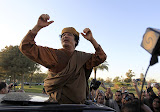Traditional deities in clash with development projects
By Kofi Akosa-Sarpong
 |
| Mayor Samuel Sarpong |
In Ghana/Africa,
some development projects could be difficult to discharge against rigid
traditional beliefs. In some places, such as Kumasi ,
capital of the Asante Region and Ghana
Taxi drivers, whose
illegal parking lots are being reclaimed for re-developed into modern markets
by the Kumasi Municipal Assembly (KMA) has resorted to the invocation of
traditional river deities, such as the much feared goddess, Antoa
Nyama, to strike the KMA mayor Samuel Sarpong to death.
As an Asante growing up in traditional settings in Kumasi
Even in Mayor
Samuel Sarpong one can sense some anxiety from the Antoa Nyama curses heaved
on him.
You don’t have to
be traditional metaphysician to analyse Mayor Samuel Sarpong: “The Kumasi
Metropolitan Assembly says it is undeterred by the invocation of curses on its
officials by transport operators over construction works at the Kejetia Lorry
Terminal … I am staunch Christian well covered by the blood of Jesus Christ
therefore the invocation of river gods and other deities to hurt my life will
fail,” said Mayor Samuel Sarpong, revealing certain waves of spiritual
insecurity and fear. “I have done no wrong, so the invocation of the deities
against me will not work.”
Mayor Samuel Sarpong
is an Asante and have been
socialised into the Antoa Nyama belief, as part of the Asante
Yes, but in this
contest, Mayor Samuel Sarpong could, traditionally, counter the taxi drivers’
curse by praying to Antoa Nyama to either mediate or ignore the taxi drivers’ oath
by telling the deity that a modern market is to be constructed and that the
taxi drivers were using the disputed lots illegally.
And how would Antoa
Nyama decide? Strike Mayor Samuel Sarpong to death and let the taxi
drivers stay at the disputed lot or dismiss the taxi drivers’ jinx
and let the construction of modern market take its course.
The taxi drivers’
use of traditional deities isn’t characteristics of all Asantes. Perhaps the
taxi drivers didn’t get enough information about the market projects or they
weren’t involved in discussing the projects. Not all Asantes invoke river
deities as curses to impede development projects.
Like anywhere in
the world, some development projects could cause protests from varying reasons
but that doesn’t mean those involved in the project should be threatened either
spiritually or physically. The most civilised action by the taxi drivers is
suing the Kumasi Municipal Assembly on the issue so that they could decide on
the outcome. And not throw curses and threats of death which larger
consequences nobody knows.
Like most on-going
projects in the Asante Region, the massive Kumasi Sun City scheme, which
construction is underway, didn’t incur the anger and traditional spiritual
curses of the large traders who were operating at the site – the former Kumasi
Race Course.
While some of the
traders, who were relocated to a new site, belief in traditional river deities
such as Antoa Nyama, they were able to balance the larger
socio-economic outcomes to be generated by the Kumasi Sun City project – jobs
for their folks, attracting international investors, boosting tourism, and the
development of other socio-economic infrastructure - against their traditional
spiritual believes to stop the Sun City project.
Freed from any
attempts to summon any traditional river deity to strike the investors to death
or put them in spiritual nervousness, the Kumasi Sun City project, a replica of
the one in South Africa, when finished “will be a multi-purpose world class
facility comprising a shopping mall, banks, insurance building, an amusement
park and fitness centre, a five-star fully-equipped international clinic with
an ambulance station and a helicopter pad.”
The Kumasi Sun City
project “will also have doctors' bungalows and other ancillary staff quarters,
a five-star hotel, 240 semi-detached executive houses within eight
gated-communities of its own with each community having its own swimming pool
and tennis court.”
If Ghanaians want
development, some say “rapid development,” then why should a traditional deity
asphyxiate the hard needed development projects? What does this say about the traditional
deity? Is the traditional deity for progress or against progress? This is a
development and traditional divinity dilemma in the African development
context!
Like most deities
the world over, Antoa Nyama could be entreated for progress and, at the same
time, for retribution. But how this two attributes play
into the taxi drivers and Mayor Samuel Sarpong mesh is a question development
expects are to answer as Ghanaians/Africans progressively modernise and their
culture increasingly enter their development processes.
The reality is that
Antoa
Nyama is two-faced: she could be prayed for progress and she could also
be invoked for punishment.
How does
development expects get involved in this Antoa Nyama-taxi drivers-Mayor
Samuel Sarpong tangle in such a way that the constructive aspects of the
traditional deity is made to outweigh its supposedly destruction parts for
progress, so that modern markets or a Kumasi Sun City project could be
undertaken without making trouble with the Ghanains’/Africans’ cosmology?
The answer lies in real
dialogue in development planning in such a way that Ghanaian/African tradition
is integrated deeply into the project planning. In Tradition, Culture And
Development in Africa: Historical Lessons for Modern Development Planning
(2006), Ambe J. Njoh, a professor in the Department of Government and
International Affairs, University of South Florida, USA, argues that one of the
reasons why Africa lags behind in development is the lack of African culture in
Africans’ socio-economic planning, which is still driven by overly Euro-centric
paradigms.
In the twists-and-turns between the taxi
drivers, the traditional river deity and Mayor Samuel Sarpong, we get a sense
of why Kofi Akosah-Sarpong,(BA,MJ,MA) wrote in from Ottawa, Canada
















No comments:
Post a Comment